

Monday, March 24, 2025
Kevin Anderson
Software Development for Startups: Launching Successful Products
Launching a startup in 2025 requires more than just a market‑disruptive idea. Success hinges on fast, agile development cycles and user‑focused products that can adapt quickly to feedback. That’s where custom software development for startups makes a tangible difference. Tailored solutions help early‑stage ventures achieve product‑market fit faster, reduce overhead, and attract investor interest. Whether you’re a solo entrepreneur or have a small internal dev team, the right custom‑built application can be your competitive edge.
In this guide, we delve into the key considerations, challenges, and best practices that turn startup ideas into tangible, scalable solutions. We’ll address core questions on methodologies, MVP builds, outsourcing vs. in‑house decisions, and how to pick a custom software development company for startups that will deliver real value.
Table of Contents
- Why Custom Software Matters for Startups
- Top Methodologies for Startup Development
- MVP vs. Full‑Scale Projects
- In‑House vs. Outsourced Development
- When to Outsource Custom Software Development
- Recommended Services & Best Practices
- Ensuring a Secure Development Environment
- Choosing a Custom Software Development Firm
- Conclusion

Why Custom Software Matters for Startups?
Custom software isn’t just for large enterprises. Early‑stage companies benefit significantly from solutions designed to meet specific user needs and workflows. A custom software development agency for startups can be critical for several reasons:
- Unique Value Proposition: Off‑the‑shelf tools rarely offer the personalization or advanced features that impress early adopters and potential investors. Custom solutions allow you to focus on what truly sets your product apart.
- Targeted Functionality: Startups often have narrow objectives—such as hyper‑focused lead qualification or specialized data analytics—and custom code can be perfectly aligned with these goals without unnecessary extras.
- Ownership & IP: With a custom‑built solution, you fully control the source code, enabling swift pivots and expansions. This ownership reassures investors that your product is truly independent.
- Scalability: From day one, your system can be architected to handle scaling demands, ensuring that you won’t outgrow your software as you progress through Series A, B, or beyond.
- Time to Market: Leveraging agile sprints, either in‑house or outsourced, can deliver a minimum viable product (MVP) in weeks, allowing you to quickly gather user feedback and iterate.
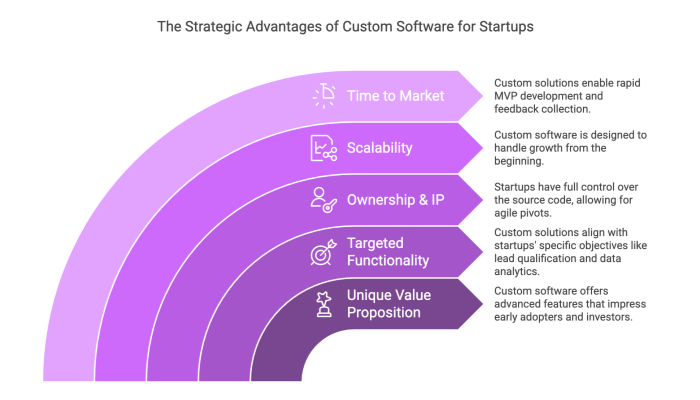

Top Methodologies for Startup Development
Most startups adopt agile frameworks to maintain speed and flexibility. Popular methodologies include:
- Agile (Scrum, Kanban, Lean):
- Scrum: Utilizes sprints of 1‑4 weeks, daily stand-ups, and product increments delivered at each iteration.
- Kanban: Employs visual task boards and continuous release cycles, ideal for teams with fluid priorities.
- Lean: Focuses on delivering only the minimal viable functionality, with rapid feedback loops and continuous improvement.
- Feature‑Driven Development (FDD): Organizes development around small, user‑centric features delivered regularly. This approach is particularly effective when the product backlog is well‑defined.
Key takeaway: Choose a methodology that aligns with the scope of your idea, whether you need tight sprints with Scrum or more fluid, continuous releases with Kanban.
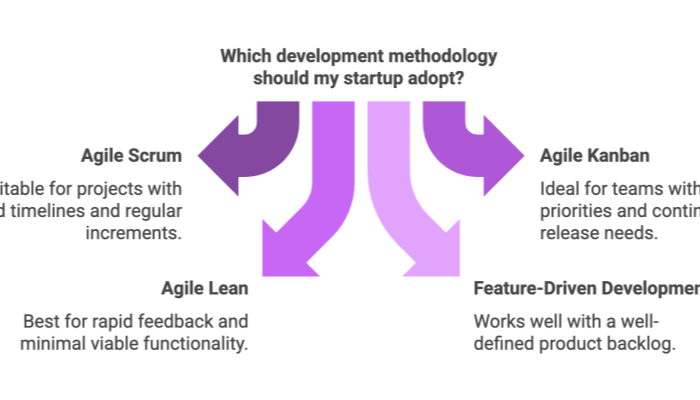

MVP vs. Full‑Scale Projects
A Minimum Viable Product (MVP) includes only the core features necessary to test assumptions and gather early user feedback. Modern MVPs must still incorporate:
- Intuitive UI: Even an early version must offer a user-friendly interface in today’s competitive environment.
- Security & Stability: Skimping on these aspects can damage your brand’s reputation from the start.
- Scalability: If your MVP resonates with users, your system must be ready to scale quickly to accommodate growth.
In contrast, full‑scale projects are built with a broader feature set and more advanced architecture. This includes:
- Advanced Architecture: Incorporating microservices or cloud‑based containers that support modular expansion.
- Broader Feature Set: Seamlessly integrated modules such as CRM, analytics, and comprehensive user management.
- Higher Time & Budget Commitment: These projects require more resources and longer development cycles to deliver a complete, market‑ready product.


In‑House vs. Outsourced Development
Choosing between in‑house and outsourced development is a pivotal decision for startups. Each option has its pros and cons:
- In‑House:
- Pros: Direct communication, constant oversight, and deeper product ownership.
- Cons: High overhead costs, lengthy hiring processes, and limited access to specialized skills in small teams.
- Outsourced:
- Pros: Quick access to domain experts, cost-effectiveness, and elimination of lengthy HR processes.
- Cons: Possible communication gaps and risks related to code ownership and intellectual property if not managed with clear contracts.
- Hybrid Approach: Many startups find a middle ground by forming a small internal core team (such as a CTO and product manager) and leveraging outsourced specialists for development, QA, or DevOps tasks.
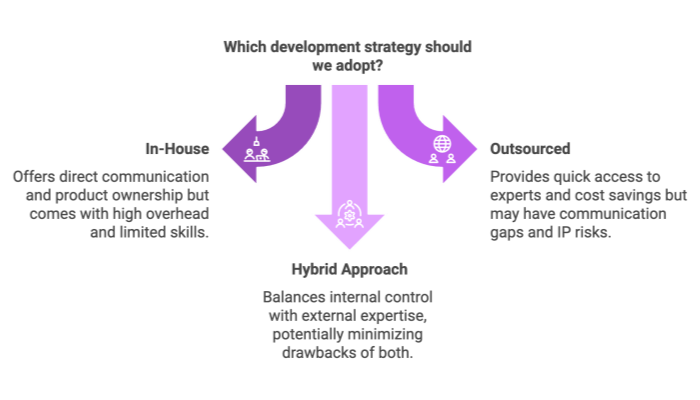

When to Outsource Custom Software Development?
Outsourcing can be an effective strategy for startups facing resource constraints or requiring rapid development. Consider outsourcing when:
- Idea Validation: MVP-level solutions can be developed faster by specialized external teams, allowing for quick feedback and funding validation.
- Budget Constraints: Custom software development services can be more cost-effective than building a full in-house team, particularly for accessing advanced skills.
- Scaling Expertise: If early traction demands rapid scaling, outsourcing offers an on-demand workforce that can accelerate development.
- Temporary Team Extension: For short-term projects where additional testers, UI/UX designers, or mobile developers are needed, outsourcing fills the gap without permanent hires.
- Competitive Timelines: When speed is critical—such as pitching at a major conference—external dev resources can drastically reduce time to market.
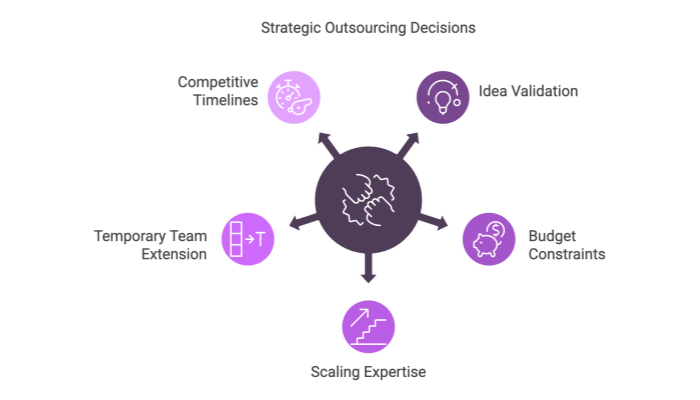

Recommended Services & Best Practices
Startups should look for development partners that offer comprehensive end‑to‑end services. These may include:
- Proof of Concept (PoC) & Prototype: Early demonstrations to test technical feasibility and garner investor interest.
- End-to-End Development: Complete services from ideation and architecture design to coding, QA, deployment, and maintenance.
- Dedicated Team Services: A dedicated team that acts as an extension of your core staff, enabling continuous feature rollouts.
- Agile Best Practices: Iterative sprints, daily stand-ups, continuous testing, and regular user feedback to refine the product.
- Documentation & Knowledge Transfer: Ensuring smooth handoffs and long-term sustainability even if team members change.
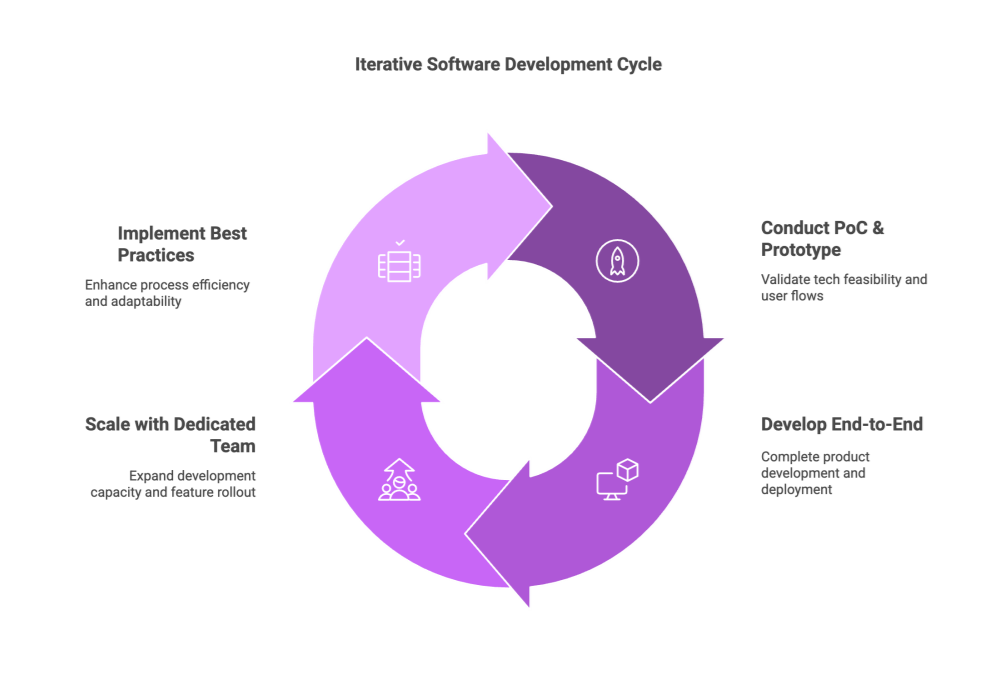

Ensuring a Secure Development Environment
Security is paramount for startups developing custom software. The best security measures for a startup’s development environment include:
- Encryption Everywhere: Use SSL/TLS for data in transit, disk encryption for data at rest, and secure password practices (hashed and salted).
- Role‑Based Access: Limit privileges to only those who need access, and avoid using default credentials.
- Continuous Testing & Monitoring: Employ code scanning (SAST/DAST), intrusion detection systems, and set up automated alerts for unusual activities.
- Zero‑Trust Approach: Assume every endpoint is vulnerable and enforce multi-factor authentication (MFA), regular code audits, and maintain thorough logs.
- Immediate Deactivation: Promptly revoke access for departing employees or contractors to safeguard against unauthorized access.
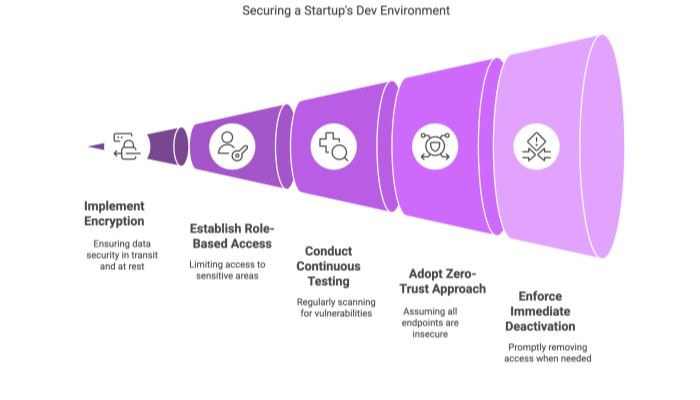

Choosing a Custom Software Development Firm
When selecting a custom software development partner for your startup, consider these key criteria:
- Domain Expertise: Ensure the firm has a successful track record with projects in your industry, which could range from fintech to health tech or e‑commerce.
- Technical Mastery & Stack Alignment: Verify that the firm supports the programming languages and frameworks your project requires. Startups often lean towards Node.js, Python, or Java for back‑end development and React Native, Swift, or Kotlin for mobile solutions.
- Communication & Culture: Look for agile‑friendly workflows, frequent demos, and direct communication channels like Slack or Zoom. A good cultural fit will make collaboration smoother.
- Transparent Pricing: Ask for detailed, itemized estimates and determine whether the firm uses time‑and‑materials (T&M) or fixed‑price models. T&M is typically better for iterative MVP builds.
- Ownership & Contracts: Retain full ownership of your source code and intellectual property by ensuring robust NDAs and clear contractual agreements.
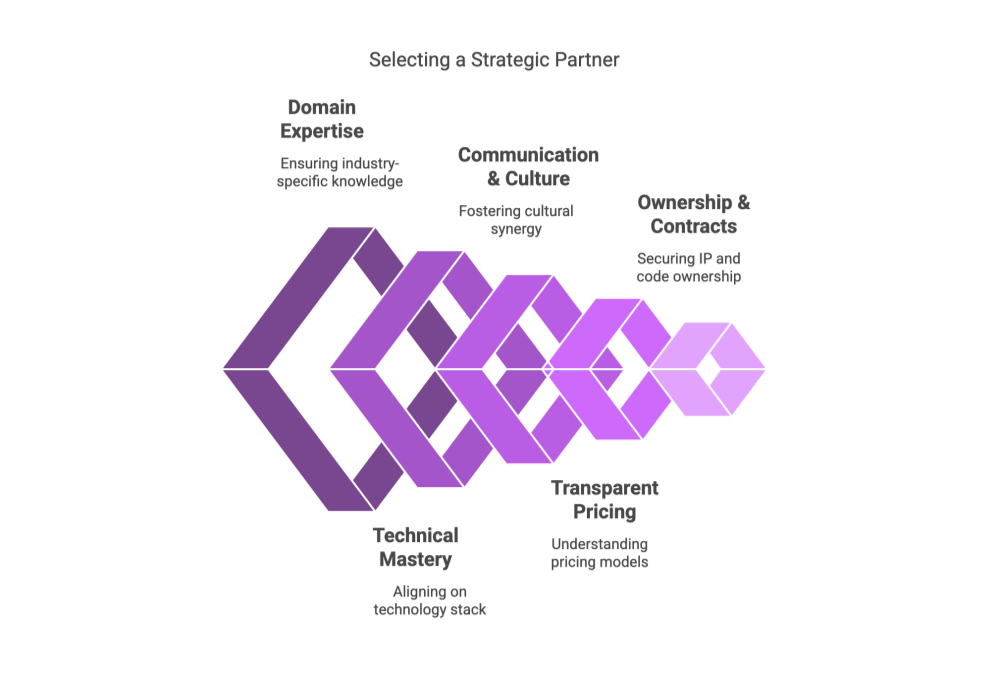

Conclusion
Custom software development for startups is an ever‑evolving, highly flexible process where creative ideas meet agile engineering. From concept validation and MVP prototypes to scale‑ready full‑stack products, the right partner can expedite product‑market fit, reduce overhead, and deliver a secure, user‑centric application that resonates with customers and investors alike.
In 2025’s competitive climate—where the synergy of speed, innovation, and reliability sets winners apart—early‑stage companies cannot afford subpar technology. Embrace an agile approach, prioritize robust security, and choose a custom software development company that aligns with your domain, communication style, and growth roadmap. Through a blend of forward‑looking architecture, iterative feedback, and unwavering user focus, you’ll transform your big idea into a powerful, high‑performing product that captures both market share and investor confidence.
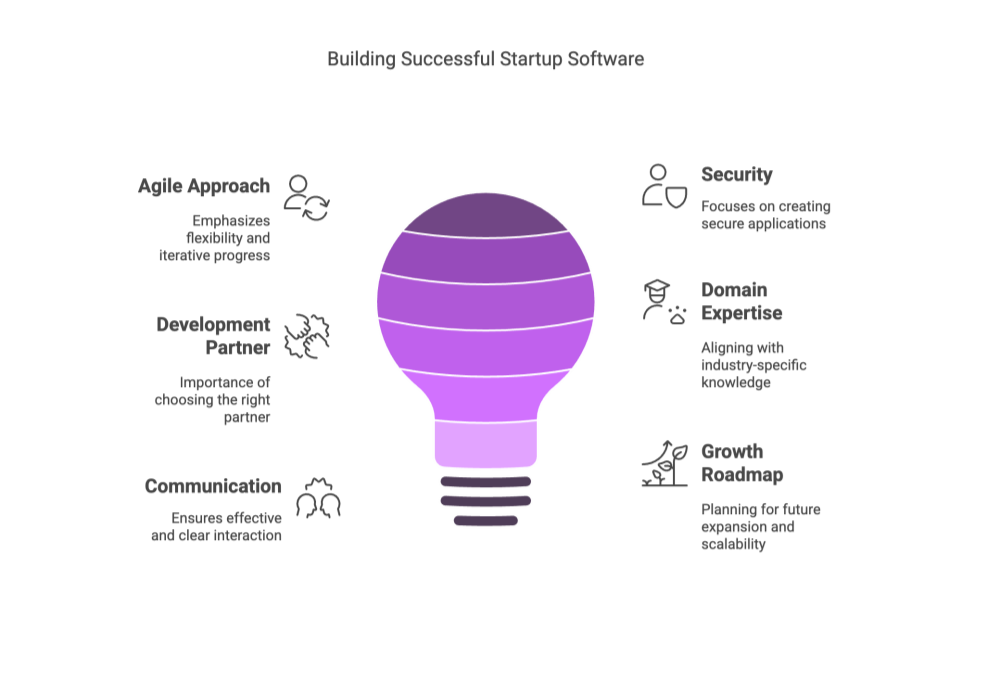

Get in Touch With Us
If you’re ready to launch your startup with a custom software solution that accelerates your path to market and drives innovation, contact us today. Let’s work together to turn your vision into a high‑performing product that sets you apart in a competitive landscape.
